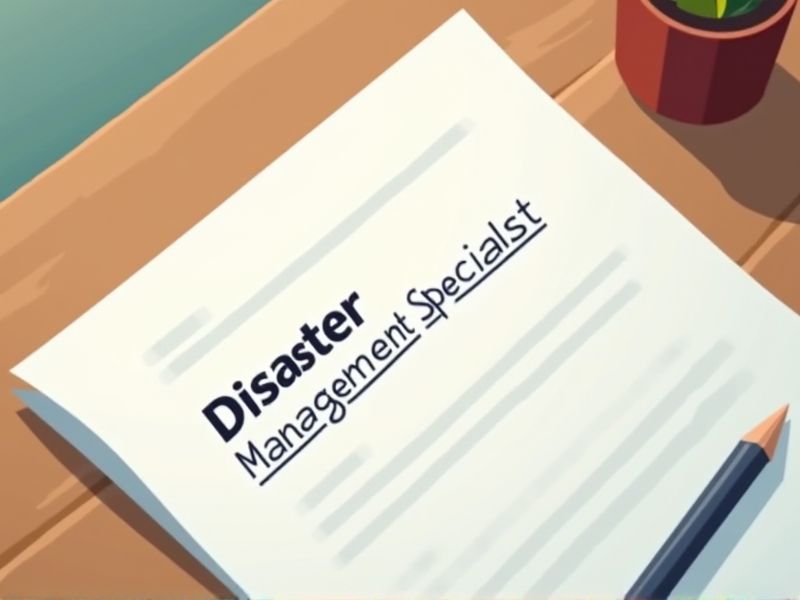
In the field of disaster management, unanticipated events require a deep understanding of crisis response and mitigation strategies to ensure public safety effectively. Certifications provide evidence of a specialist's technical skills and knowledge, enhancing their ability to manage emergencies efficiently. These credentials also instill trust among stakeholders, assuring them that operations are handled by qualified professionals. Some essential certifications you may pursue for a career as a Disaster Management Specialist include the following.
Certified Emergency Manager (CEM)
Certified Emergency Managers provide validated expertise, which enhances the credibility and trust in disaster management efforts. The CEM certification ensures specialists possess a thorough understanding of emergency management principles, which aids in efficient disaster response and recovery. Continuous education requirements associated with CEM keep professionals updated with the latest practices and strategies. The certification fosters a standardized level of knowledge and skills, which is crucial for effective coordination among different agencies during emergencies.
FEMA Professional Development Series Certification
The FEMA Professional Development Series Certification enhances a disaster management specialist's foundational understanding of emergency management principles, increasing the effectiveness of incident response. This certification serves as a standardized benchmark, ensuring all specialists possess a consistent level of knowledge and skills, which facilitates better coordination during crises. Employers value this certification as it indicates a commitment to continued professional growth and adherence to best practices in disaster management. With increasing frequency and complexity of disasters, the specialized training provided by this certification equips professionals to adapt and respond effectively to evolving challenges.
National Incident Management System (NIMS) Certification
NIMS Certification provides standardized guidelines, which enhance interoperability and coordination among various emergency response teams. Effective disaster management requires unified command structures, and NIMS ensures everyone operates under the same framework. Specialists equipped with this certification are more adept at integrating resources and efforts during complex emergencies. Adopting NIMS methodologies increases overall efficiency in response, reducing recovery time and potential losses.
Associate Emergency Manager (AEM)
The presence of an Associate Emergency Manager (AEM) in disaster management strengthens the planning and coordination processes critical for efficient response strategies. Their expertise aids in risk assessment, which directly affects resource allocation and reduces potential damages. They play a crucial role in training and exercises, ensuring disaster management specialists remain informed and capable of executing their responsibilities effectively. AEMs enhance inter-agency communication, facilitating a more unified approach to disaster response and recovery efforts.
Certified Business Continuity Professional (CBCP)
Certified Business Continuity Professionals bring critically-needed expertise in identifying vulnerabilities and developing robust contingency plans, strengthening an organization's ability to withstand disruptions. Their accreditation represents a high standard in business continuity, ensuring that Disaster Management Specialists can effectively integrate strategies to minimize downtime and economic impact. CBCP holders possess a deep understanding of risk assessment and management techniques, which is essential for creating adaptive and resilient recovery protocols. Their skills in testing and maintaining continuity plans ensure that an organization remains prepared for potential disasters, safeguarding both operations and public reputation.
Master Exercise Practitioner (MEP)
Master Exercise Practitioner (MEP) training equips Disaster Management Specialists with advanced skills to design and execute realistic disaster simulations. This comprehensive training enhances their capability to test and improve disaster response plans, ensuring better preparedness. MEPs provide a structured framework that helps identify potential weaknesses in emergency protocols before an actual disaster occurs. The expertise gained from MEP programs results in more efficient resource allocation and effective coordination during real-world emergencies.
Certified Homeland Security Professional (CHSP)
A Certified Homeland Security Professional (CHSP) provides expertise essential for coordinating comprehensive disaster response strategies. They possess critical knowledge of national security policies and emergency preparedness, enhancing a Disaster Management Specialist's ability to address complex threats. Their training includes risk assessment and resource management, crucial for efficient disaster mitigation and recovery. Their certification validates skills important for building resilient systems and effective communication networks during crises.
Disaster Recovery Professional (DRP)
A Disaster Recovery Professional ensures that organizations can quickly restore critical functions following a disruption, minimizing downtime and financial loss. They develop and implement comprehensive recovery plans tailored to specific organizational needs, enhancing overall resilience. Their expertise in risk assessment allows them to identify vulnerabilities and mitigate potential impacts before disasters occur. By maintaining compliance with industry regulations, a DRP aids organizations in avoiding legal penalties and ensures a smoother recovery process.
Crisis Management Certification
Crisis management certification enhances a disaster management specialist's ability to anticipate potential crises by providing structured methodologies and frameworks. This certification ensures specialists are equipped with the latest strategies to effectively coordinate resources and manage communications during emergencies. With certification, specialists gain credibility and trust, which are crucial when working with government agencies and international organizations. The training involved bridges the gap between theory and practice, making specialists more adept at implementing real-time solutions during disasters.
Project Management Professional (PMP)
Having a Project Management Professional (PMP) certification equips a Disaster Management Specialist with structured planning skills, vital for managing resources in crisis situations efficiently. The certification introduces standardized methodologies, enabling specialists to execute projects systematically, reducing errors and oversights. Knowledge from PMP helps in coordinating diverse teams, crucial for timely disaster response and recovery efforts. PMP enhances risk assessment capabilities, allowing the specialist to foresee potential challenges and mitigate them proactively during disaster management operations.
Summary
By obtaining certifications, you enhance your expertise in disaster management, making you more effective in your role. With improved skills, you can better assess risks and implement efficient strategies during crises. This increased competency allows you to lead teams more effectively and coordinate resources with precision. Consequently, communities benefit from more robust and well-prepared responses to emergencies.
